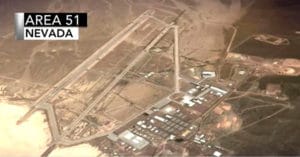The originally anonymous creator of a Facebook spoof has gone public to explain he meant the storming of Area 51 on September 20 – “to see them aliens” – as a joke. What got him to break cover was 1.9 million people (so far) clicking to say they’re going, with a further 1.4 million people declaring themselves interested.
Let’s consider why so many people have backed the event. The majority surely understand it’s all a joke (don’t they?), and are enjoying a communally shared sense of humour. Though does it also show a significant feeling of distrust of authorities that so many people have jumped to enlist their support in hoping to expose a US Government secret or uncover institutionalised deceit?
At the same time, real UFO enthusiasts have the chance of notoriety to be at an event that has made world-wide headlines. Do they also scent a chance to be on television saying “I told you so”?
 Challengingly tagged as “They Can’t Stop All Of Us,” Area 51 is the commonly used name of the location of a highly classified United States Air Force (USAF) facility located in the southern part of the state of Nevada. There is a long-term rumour that it is a UFO and extraterrestrial research centre that stores the remains of aliens who visited Earth and didn’t make it back again to wherever they came from.
Challengingly tagged as “They Can’t Stop All Of Us,” Area 51 is the commonly used name of the location of a highly classified United States Air Force (USAF) facility located in the southern part of the state of Nevada. There is a long-term rumour that it is a UFO and extraterrestrial research centre that stores the remains of aliens who visited Earth and didn’t make it back again to wherever they came from.
The USAF claims it is an open training range, though since its existence was finally acknowledged in 2013 it is widely believed that the remote base most likely supports the development and testing of experimental aircraft and weapons systems. If any of these were seen on test flights by the general public there’s a chance they could have been mistaken for UFOs.
Though Agent Mulder from the X-Files, a personal believer in the paranormal and prone to conspiracy theories, would likely call that a double-bluff.
There are several signs that Matty Roberts, the California resident behind the “Storm Area 51” Facebook event, intended it to be taken as a joke all along. Yet it has nevertheless galvanized a massive and potentially powerful crowd, which often makes those in charge feel nervous. “You’ve got the guns, but we’ve got the numbers,” sang Jim Morrison of the popular 60s and 70s band The Doors.
 Matty’s suggestion that running Naruto-style meant people would be able to dodge bullets fired by military guards protecting the base is a bit of a giveaway. If you’re not totally up to speed on this, Naruto is a Japanese television series about a young ninja named Naruto Uzumaki who runs in a very stylized way with arms outstretched behind him. It actually proves to be rather awkward and difficult, and definitely not a bullet-dodging tactic.
Matty’s suggestion that running Naruto-style meant people would be able to dodge bullets fired by military guards protecting the base is a bit of a giveaway. If you’re not totally up to speed on this, Naruto is a Japanese television series about a young ninja named Naruto Uzumaki who runs in a very stylized way with arms outstretched behind him. It actually proves to be rather awkward and difficult, and definitely not a bullet-dodging tactic.
Fairly predictably the USAF has firmly condemned the event and aims to deter people from turning up and trying to break in: “We would discourage anyone from trying to come into the area where we train American armed forces. The US Air Force always stands ready to protect America and its assets,” Air Force spokeswoman Laura McAndrews told The Washington Post.
The few providers of accommodation in the area are booked up and would be totally overwhelmed by the arrival of even the tiniest proportion of all those who have said they will attend. “Our phone won’t stop ringing,” Connie West, of the Little A’le’Inn, told the Las Vegas Sun. This 10-room motel is one of the few businesses in Rachel, a nearby town of just 54 residents now gaining celebrity status among aviation and UFO enthusiasts attracted by “Storm Area 51” event. And there’s nothing available on Airbnb – we checked!
How many people will actually turn up? Who knows, though apparently just 1,000 would be enough to paralyze the local area’s fragile infrastructure. How far out will the military set up an exclusion zone with inevitable road blocks, and perhaps admit only those with booked accommodation? How long before, and after, the scheduled “storming time” of 3 a.m. on September 20 could there be flashpoints? Let’s hope it remains peaceful – it was only intended as a joke.
Do we have any readers who can help the rest of us with a psychological insight to this mass-following of an event clearly not intended to be taken seriously? And how much does it demonstrate societal distrust towards establishments?





0 Comments